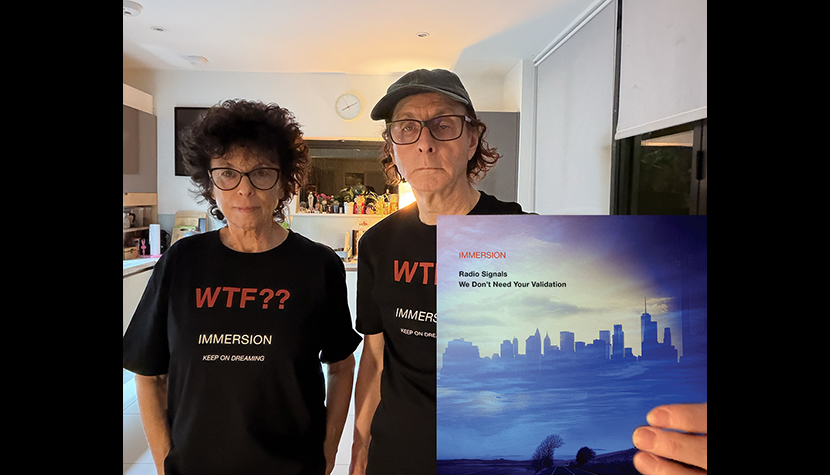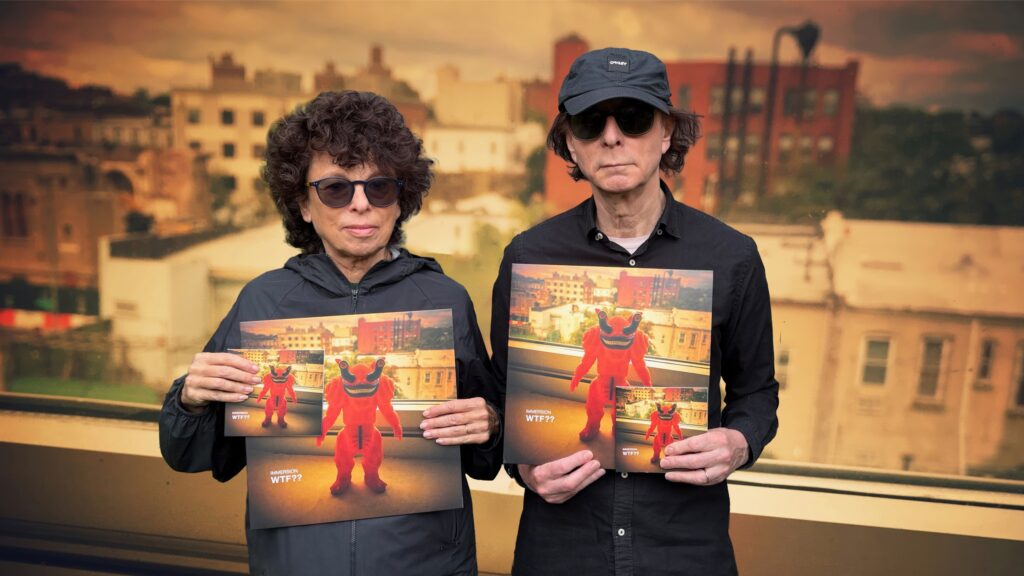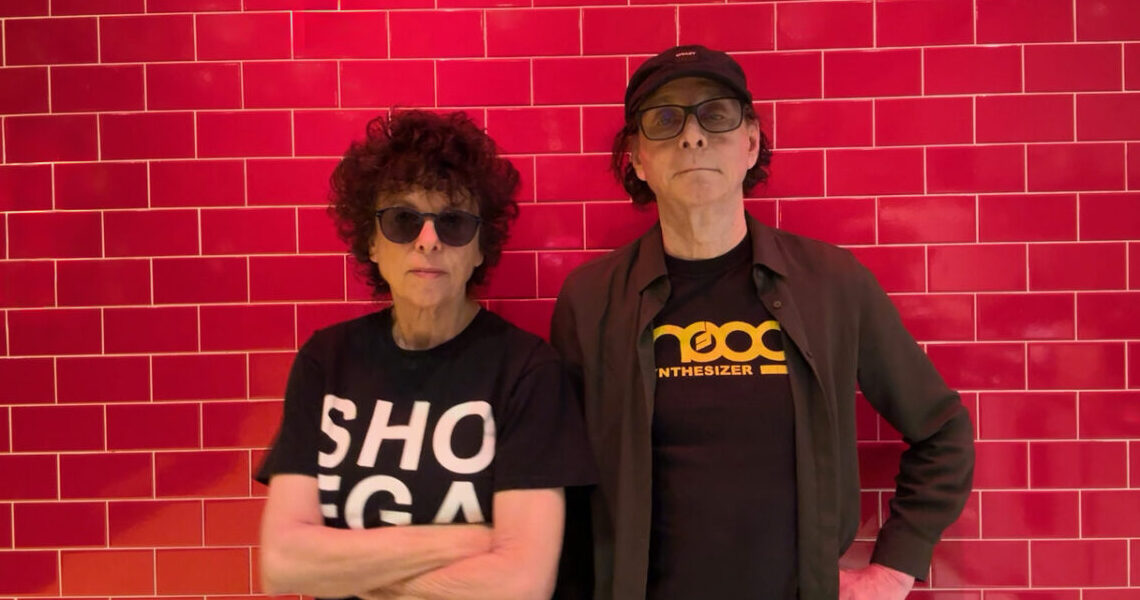Immersion is the project of post-punk musical duo Colin (Wire) and Malka (Minimal Compact) - Nic Howden dived in:
Covid-19 stopped the Wire tour in/around New York, in March 2020. Pinkflag, the band’s record label, put out the ‘Not About To Die’ collection of ‘Chairs Missing’/’154’ demos a couple of years later, but there has been little word since.. beyond stuttering news about Malcolm Boyle/Graham Duff’s long promised ‘Wire – People In A Film’ documentary .
Wire bought the rights to their 1970s catalogue, so there’s a good, regular income for the band members, albeit ‘not swimming pool money’, but singer/songwriter Colin Newman won’t sit still. He never has. Forty years working with his partner Malka Spigel, formally of post-punk band Minimal Compact, has seen them running the Swim label, recording solo albums, Githead records, collaborations, and a substantive run of Immersion LPs. They released ‘Nanocluster Vol. 3‘, with American ambient country group SUSS, in February, and the equally fabulous ‘WTF??‘ on September 28th, a synergy of man/woman and machine, with a final date on the tour behind it at Alphabet next month (December 2025).
A pleasure then to catch up with Colin and Malka at their Brighton home, via Zoom, and talk about pretty much all of those things:
DEDICATED
Moving from Brussels to London in the early 1990s with Malka’s material for a solo album, ‘Rosh Ballata‘, Newman and Spigel decided THEY were going to put it out. “This was the dawning of the electronic age and we had to learn everything,” Newman says. “We also understood this is a great way to work, finally the technology allowed you to do that. I never wanted to put out 80s-style low-fi recordings I always wanted stuff to sound as good as it could. We didn’t have money to spend on big studios so we put the whole thing together and it gave us a grounding in how to do that.”
“And in doing things on our own terms,” Spigel adds.
TIMELINE
I’ve seen Wire a whole lot and picked up a weight of their LPs over the years, but just one Githead EP, ‘Headgit‘, from the substantial Newman/Spigel stable. So, I surprised myself by heading to Swim and clicking the ‘buy’ button in response to an email prompt pitching a pre-order for ‘WTF??‘ (WTF) early August. Not a clue what to expect. Postie handed over the parcel a couple of months later, and I dropped the needle.
Like Wire, Immersion is a very descriptive band name – therapy to the former’s tension. The record opens with pulsing, synth driven ‘Defiance‘ – ‘Assault on Precinct 13’ title sequence-style – and closes about half-an-hour later with ‘On The Longest Day‘. It’s fabulous. Invigorating.

BACKGROUND
“The roots of Immersion are a long time ago,” Newman says. “We put our first album out in 1994, and we started as an electronic duo.” “The most getting away from the image we came from that we could possibly do,” Spigel smiles. “In terms of music, even how you present or don’t present yourself, the whole techno vibe was, ‘it’s not about a personality or who you are, it’s about the music.’” You can poke about for parallels, Newman’s voice on ‘Use It Don’t Lose It‘ takes me back to ‘Adapt‘ from Wire’s 2011 LP ‘Red Barked Tree‘, but you have to twist and turn to get there. “’Use It Don’t Lose It‘ was started by Malka,” Newman says flatly. “It’s probably the most Wire-like because it’s the most you-like,” Spigel interjects. “Colin is quite cautious, and rightly so, not to mix the two things. Because he’s well-known for Wire.”
Steeped in post-punk, production, and DJ culture they might be, but ‘WTF??‘ is just as much a product of Swimming In Sound, Newman and Spigel’s weekly radio show which they started in lockdown. “Like any musician we have a pretty broad taste but realised very quickly that our record collection wasn’t going to last very long in terms of number of shows,” Newman explains. “Malka is very good at sifting through a lot of what comes out, and we started picking up on different trends. If you’re listening every week to new artists and new genres – we’re not sitting there with a smorgasbord saying, ‘We’ll have a bit of that and a bit of that’ – but it subconsciously goes in.”
Myriad influences then, which bring an ethereal, filmic quality to an album written in reaction to the parlous state of everything. ‘Are we too small to make a difference? Maybe, but we can only try…’ [‘Push The Rock‘]. “We’ve been on this planet long enough to understand that you can’t change the world by making a record, but it does connect to people,” Newman says. “They do listen to what you say and you can change the way an individual feels about themselves, about life, about anything, by something that you’ve done.”
“What can you do when you’re faced with what’s happening? You have to stay positive,” Spigel adds. “And when you create you become more positive.” Listening to WTF, Newman/Spigel’s practice in production is evident and there is no trace of over indulgence on either side of the studio partition. “We’re not that kind of people,” Newman says, almost aghast. “What would be the point of it? Once you have to get to a certain age, you have to be twice, three times, four times, five times as good as someone younger. They are expected to be cool and hip and of the moment while you’re expected to be old and past it and not have a fucking clue about what’s going on and endlessly repeat the past.”
Also, despite having the unmetered capacity to wave things through – Holy Fuck drummer Matt Schultz, based in Ohio, is the only other player on this record after all – Newman and Spigel are zealous in ensuring quality control. At the risk of sounding a bit W1A, they are assiduous in their commitment to better. To best. “The politics of bands,” Newman says, ‘Oh, you’ve got to have that bit because it’s the only bit they do in it’. ‘Yeah, but that bit’s not so good…’ The way that Malka and I work together, we’re pretty honest and straightforward with each other. We hear in different ways. I’m a great believer in complementary skills. Why do a collaboration if you’re collaborating with someone who’s just the same as you?”
“It’s so easy because we complete each other,” Spigel says. “Each of us comes with our own feedback, and point of view. There was never ego between us but you kind of develop how you work together and it becomes very free and very open.”
“Immersion is Immersion. If you want something different, we aren’t that. Take us on our terms. We’re not like a second-rate Wire. We’re not instead of Wire until Wire comes along,” Colin Newman, October 2025.
ON THE ROAD
Playing live should be about the moment rather than trying to replicate the record, and despite input/tramlines from machines, an Immersion performance has all of that spontaneity. “I have a problem with people standing with a laptop and pressing play,” Spigel says. “I think what audiences love is that’s it’s not perfect but that you’re throwing yourself in and taking the risk. It’s whatever happens on the night. Vocals express your mood.”
“Malka is pretty free on stage, but she’s not swinging from the chandeliers or anything,” Newman laughs. “If [she is] happy with how it goes across and how it works, then I think that’s alright. Malka is very, very critical, and she’s someone who’s more comfortable in live performance than I am. I’ve always struggled with it a bit. Playing guitar and singing is not as hard as playing bass and singing, but it is difficult to do. One of the two gets compromised but usually both. “It can be quite frustrating, not getting through to everywhere we probably should, and where people, we know, would like it. Our way of doing it is the grassroots route. We tour grassroots venues, building up an audience like that.”
Such is their creative spur, Immersion have recorded two new tracks since the album which are in the set and exclusively available from the merch stand at shows, on lathe-cut 7inch single. Something for fans who have ‘WTF??‘ and want something else tangible to take away. “That’s building towards the next album,” Newman says. “More than likely, we’ll tour again next year, here and in Europe. It’s step by step. We literally did our first British tour last year. The way the industry works now, the releases are promoting the gigs, not the other way around. You have to be smart enough to not spend a fortune on the road so you can come out of it not being thousands of pounds in debt.”
“We do it modestly,” Spigel says. “On the American tour [with SUSS] we stayed in the cheapest motels. Same in the UK. It’s very basic.” “I enjoy touring with Malka,” Newman adds, almost unnecessarily. “We’re a unit. We do everything together. We are kind of an entity together. We speak with one voice – we’re not speaking at the same time, it’s not freaky sci-fi stuff – but if Malka’s saying something in an interview, she’s saying what we think.”

(NOT) BEING SUCKED IN AGAIN
Newman and Spigel know the machine well enough to not to be corrupted by it. They come at everything with a strong spirit of no compromise. “There is no point in not doing something in the best way you possibly can and that you believe in. Most people of our age have given up or retired and that’s not very interesting,” Newman says. “The whole thing to do with the heritage industry is pretty disgusting. As far [they are] concerned what I should be doing is playing ‘Pink Flag‘ in large venues.”
“You’d make people happy,” Spigel says, devil’s advocate hat askance.
“It wouldn’t make anyone doing it happy,” Newman counters quickly. “Why would anyone pay money to see miserable people on stage doing something they don’t really want to do?”
“Because it takes them back to their youth.”
“So that is entertainment then, you’re just doing it for someone else. You’re not doing it for yourself? The big difference between art and entertainment.”
“I’m not saying it’s a good thing to go and play your old music, I’m trying to see it from their point of view and the point of view of musicians who don’t have new material,” Spigel says. “It’s true,” Newman concedes. “A lot of musicians don’t own their catalogue and don’t have any income from it. I can only think personally. It’s kind of background motivation, why to do Immersion and why do it in this way. Ultimately, it’s our idea of fun.”

WRAPPING PEOPLE IN A FILM
Colin Newman will record his last interview for the long awaited, fan-funded Wire documentary in December. “It’s going to be on the subject of the Wire catalogue – the bits that Wire owns and the bits that Wire doesn’t own. The industry, just exactly what a bunch of fucking arseholes all these people are who are claiming they are behaving in a certain way, which they aren’t doing at all. What they say in public and what they say in private is completely different. My general plan is to name names and go for maximum damage. Because of what we’re doing as Immersion I feel really strong. I don’t need a publisher or an old record company to look after my career.”
“We are more aware what it’s like to be a young musician/a young band nowadays, struggling to make a living,” Spigel says “It’s much harder, impossible almost, even for someone who is quite successful. They have to have other jobs as well, unlike when Wire were operating.”
“The industry is in a worse shape than it ever was and this is not just about the majors. There are plenty of independent record companies who have no better sense of morality,” Colin Newman says in conclusion. “The two sets of people who get squeezed the most are the artist and the consumer. Those are the least important people in the process. The most important are the shareholders, in the record companies and in streaming services. None of it is transparent. You don’t see how much those companies are making out of the music. I know very well that streaming income for Wire, for Swim, is not nothing – anyone can see Spotify numbers – but I don’t know how much is taken off the top. For a lot of artists, especially older artists, their deal with their label is that they’re on the same percentage as when they signed, which was about physical product, when albums cost the price of a house to make. If you got 15 per cent you were doing really well, and they would still be on 15 per cent, or less, from streaming. In terms of what a record company needs to do to have something on streaming, it’s nothing. There is zero cost to them. Any losses they’ve made are already long since written off for tax, so they are literally taking 85 per cent of the income. People need to hear this stuff. It’s relevant to people who consume music as well. If they want artists to create, people should care.”
Immersion play two more shows this year – look out for more in 2026!
Wed 03 Dec – Edge Of The Wedge, Portsmouth
Thur 04 Dec – Alphabet, Brighton
Grab your copy of ‘WTF??‘ HERE

Main Photo Credit Courtesy of Immersion
- Defiance
- Use It Don’t Lose It
- It’s A Long Way To Brooklyn
- Timeline
- How To Be
- Change Of Use
- Push The Rock
- On The Longest Day
Follow Immersion on Their Socials:
Need more Punk In Your Life?

EP review: LoGOz killer new 4-track, ‘Method is Madness’
Northumbrian melodic punk rock band LoGOz are looking forward to unleashing their brand-new EP ‘Method is Madness’ on 19th February 2026 – and it’s their

Album review: Heart Attack – ‘The Future Is(n’t) Yours’
The band originally formed in 2021, and they deal in hard-edged yet anthemic punk rock with the occasional muscular hardcore twist here and there. Rise

Album review: Gogol Bordello boldly state; ‘We Mean It, Man!’
From the lower east side of Manhattan, American punk rock band Gogol Bordello originally formed back in 1999 and have just released their 10th album

Album review: a posthumous release from Brian James – ‘Kicks And Diabolik Licks’
Despite battling illness in recent years, Brian James stayed busy. He managed a final reunion tour with The Damned in 2022 and a couple of

Album review: AAA Gripper – ‘We Invented Work for the Common Good’
What we get are nine tightly knit songs of struggle and desperation where work is shown to be the big suppressor when living life. Angular

Live review: The Godfathers and WitchDoktors rock the 100 Club!
It’s Friday the Thirteenth, and The Godfathers are hosting their annual St. Valentine’s Day Massacre gig at The 100 Club tonight.. as frontman Peter Coyne
Writer/hip old gunslinger. Written about/reviewed live music records/recording for years – in the process interviewing Joe Strummer, Paul Simonon, David Johansen & Syl Sylvain, Pete Shelley & Steve Diggle, Hugh Cornwell, JJ Burnel, Dave Vanian & Captain Sensbile, Seggs, Jaz Coleman, Youth and more…




 Did you know that we are 100% DIY? We run our own game. No one dictates to us, and no one drives what we can or cannot put on our pages – and this is how we plan to continue!
Did you know that we are 100% DIY? We run our own game. No one dictates to us, and no one drives what we can or cannot put on our pages – and this is how we plan to continue!
